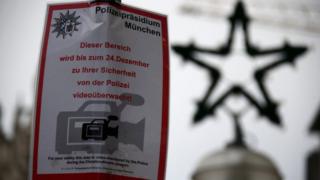 Image copyright
Image copyright
Reuters
Videos are being increasingly deployed by the German state and private firms – but critics question their impact on crime rates
Public video surveillance appears set to become more commonplace in Germany, after the lower house of parliament approved a package of new measures.
Security concerns will now be given greater weighting against privacy when venues such as shopping centres apply for permission to install cameras.
Only now will federal police get systems to scan car license plates.
Bad memories of Communist-era state snooping have made Germans wary of extending surveillance powers.
But mass sexual assaults on women in Cologne on New Year’s Eve in 2015, and a string of attacks on civilians in July, prompted Interior Minister Thomas de Maiziere to introduce the bill of measures in August.
Pressure for more effective security measures increased further after December’s lorry attack on a Christmas market in Berlin.
Germany attacks: What is going on?
How attacks are forcing Germany to examine civil freedoms
The measures were approved by the Bundestag in a marathon session on Thursday which began at 09:00 (08:00 GMT) and concluded at 01:39 local time on Friday, reported German news outlet Deutsche Welle.
Image copyright
EPA
Mass monitoring by the Communist-era Stasi intelligence agency and Gestapo secret police with devices such as hidden cameras mean many Germans today are defensive of their privacy
Authorities will still get final approval when places such as shopping centres, sports venues and car parks want to fit cameras – but “protection of life, health or freedom” will now assume greater weight.
The bill also introduces small body cameras for police – a measure whose impact on crime some critics have questioned.
There has also been some criticism of the wider measures – with some making the point that cameras are already widespread around Cologne railway station, where the New Year’s Eve assaults took place, and that what was needed was more efficient monitoring of the cameras.
“It is at least doubtful whether video surveillance is really a deterrent, and it always depends on the context that it’s used in,” Tobias Matzner, who leads a project titled Ethics of Intelligent Video Surveillance at the University of Tubingen, told Wired technology magazine.
Germany approves more video monitoring

